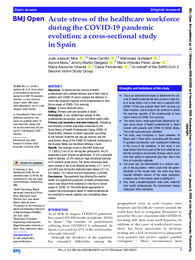Por favor, use este identificador para citar o enlazar este ítem:
https://hdl.handle.net/11000/34910Registro completo de metadatos
| Campo DC | Valor | Lengua/Idioma |
|---|---|---|
| dc.contributor.author | Mira, José Joaquín | - |
| dc.contributor.author | Carrillo, Irene | - |
| dc.contributor.author | Guilabert, Mercedes | - |
| dc.contributor.author | Mula Leal, Aurora | - |
| dc.contributor.author | Martin Delgado, Jimmy | - |
| dc.contributor.author | Pérez Jover, Maria Virtudes | - |
| dc.contributor.author | Vicente, María Asunción | - |
| dc.contributor.author | Fernández, César | - |
| dc.contributor.other | Departamentos de la UMH::Psicología de la Salud | es_ES |
| dc.date.accessioned | 2025-01-18T09:53:30Z | - |
| dc.date.available | 2025-01-18T09:53:30Z | - |
| dc.date.created | 2020-10 | - |
| dc.identifier.citation | BMJ Open 2020;10 | es_ES |
| dc.identifier.issn | 2044-6055 | - |
| dc.identifier.uri | https://hdl.handle.net/11000/34910 | - |
| dc.description.abstract | Objectives To determine the volume of health professionals who suffered distress due to their care of patients with COVID-19 and to analyse the direction in which the response capacity of the professionals to face future waves of COVID-19 is evolving. Design A cross- sectional study. Setting Primary care and hospitals in Spain. Participants A non- randomised sample of 685 professionals (physicians, nurses and other health staff). Primary and secondary outcome measures Frequency and intensity of stress responses measured by the Acute Stress of Health Professionals Caring COVID-19 Scale (EASE). Variation of stress responses according to the number of deaths per day per territory and the evolutionary stage of the COVID-19 outbreak measured by the Kruskal- Wallis and the Mann- Whitney U tests. Results The average score on the EASE Scale was 11.1 (SD 6.7) out of 30. Among the participants, 44.2% presented a good emotional adjustment, 27.4% a tolerable level of distress, 23.9% medium–high emotional load and 4.5% extreme acute stress. The stress responses were more intense in the most affected territories (12.1 vs 9.3, p=0.003) and during the disillusionment phase (12.7 vs 8.5 impact, 10.2 heroic and 9.8 honeymoon, p=0.000). Conclusions The pandemic has affected the mental health of a significant proportion of health professionals which may reduce their resilience in the face of future waves of COVID-19. The institutional approaches to support the psychological needs of health professionals are essential to ensure optimal care considering these results. | es_ES |
| dc.format | application/pdf | es_ES |
| dc.format.extent | 10 | es_ES |
| dc.language.iso | eng | es_ES |
| dc.publisher | BMJ Publishing Group | es_ES |
| dc.rights | info:eu-repo/semantics/openAccess | es_ES |
| dc.rights | Attribution-NonCommercial-NoDerivatives 4.0 Internacional | * |
| dc.rights.uri | http://creativecommons.org/licenses/by-nc-nd/4.0/ | * |
| dc.subject | anxiety disorders | es_ES |
| dc.subject | depression & mood disorders | es_ES |
| dc.subject | health policy | es_ES |
| dc.subject | organisation of health services | es_ES |
| dc.subject | public health | es_ES |
| dc.subject | quality in health care | es_ES |
| dc.subject.other | CDU::1 - Filosofía y psicología::159.9 - Psicología | es_ES |
| dc.title | Acute stress of the healthcare workforce during the COVID-19 pandemic evolution: a cross- sectional study in Spain | es_ES |
| dc.type | info:eu-repo/semantics/article | es_ES |
| dc.relation.publisherversion | https://doi.org/10.1136/ bmjopen-2020-042555 | es_ES |

Ver/Abrir:
2.e042555.full.pdf
576,65 kB
Adobe PDF
Compartir:
 La licencia se describe como: Atribución-NonComercial-NoDerivada 4.0 Internacional.
La licencia se describe como: Atribución-NonComercial-NoDerivada 4.0 Internacional.
.png)